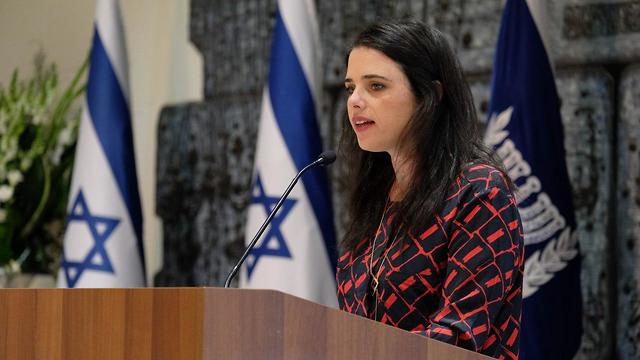
Israel is offering rehabilitation programs for men and women who manage to leave behind a life of sex work. The government on Sunday approved the rehabilitation plan, two weeks after lawmakers in the Knesset passed historic legislation that imposes fines on those who hire sex workers, rather than punishing the prostitutes themselves.
The plan's proposal, submitted by Justice Minister Ayelet Shaked, is based on the recommendations of the Interministerial Committee to Examine Tools for Reducing the Status of Prostitution, headed by Justice Ministry Director-General Emi Palmor.
The plan, which will cost about NIS 90 million over three years, will be implemented jointly by the Welfare, Health, Education and Public Security ministries.
Under the scheme, the Welfare Ministry will set up emergency apartments, half-way houses and rehabilitation hostels for sex workers. It will also formulate a rehabilitation plan for mothers who have fallen into prostitution. In addition, a special rehabilitation hostel will be set up for the use of the transgender population, and counselors and social workers will be hired to treat sex workers from the LGBT community. The ministry will also work alongside the National Insurance Institute to provide disability pensions for women who “exit” the prostitution cycle.
In addition, the Ministry of Health would increase the operations of clinics that treat former sex workers, as well as open up more clinics in new locations. The ministry will also invest in appropriate training for professionals working in health maintenance organizations and hospitals.
The Ministry of Education will create new content for sex education classes, and develop training and instruction material for school professionals. Meanwhile, the Public Security Ministry will expand various enforcement methods used by the police, including those used online.
Part of the committee's responsibilities is to treat and rehabilitate former sex workers. As part of its work, the committee met with active sex workers and with men and women in the process of leaving the cycle of prostitution.
The team has also participated in a professional seminar organized by the European Union, and learned about various ways to deal with the problem. Subsequently, a special task force was established to implement the committee's recommendations.
Ahead of its approval, Justice Minister Ayelet Shaked called the plan vital in reducing the phenomenon of prostitution in Israel, and said it would help those who managed to escape the cycle of sex work.
"The government has taken an important step in the struggle to reduce the consumption of prostitution through an effective rehabilitation program," Shaked said. "The program is designed to help bring women and men out of the cycle of prostitution and give them the opportunity to start a new life. I believe that the program will reduce the consumption of prostitution services and rehabilitate those who leave the prostitution cycle. I thank the Director General of the Justice Ministry, Emi Palmor, for her important work in preparing this plan."
According to data compiled by the Ministry of Welfare, Israel has over 14,000 sex workers, including 3,000 minors. Of the women engaged im sex work. 62% are mothers of children under the age of 18, and 76% said they would have left the cycle of prostitution if they had the opportunity to do so.
"This legislation directly impacts the lives of 14,000 Israeli male and female sex workers. For this reason, we constantly ask to increase the budgets of special rehabilitation programs. Increasing the budget by NIS 90 million could create a real alternative," said Nitzan Kahana, the associate director of Task Force on Human Trafficking and Prostitution.
Kahana also praised another Shaked program that has been advanced — the preparation of a plan to combat human trafficking for the purpose of prostitution, based on a multi-year plan for combating slavery and human trafficking formulated by the Office of the National Anti-Trafficking Coordinator at the Justice Ministry.
In line with international law, the plan will address the issues of enforcement, protection of victims, prevention and cooperation with civilian bodies and will suggest a plan of action.
"Trafficking in women has taken on various forms," Kahana said. "For years, the State of Israel has celebrated its successful war against human trafficking, while traffickers continued to bring women into the country. By approving the plan, the governmnet shows it understands that the time has come to seriously deal with human trafficking," she said.



















